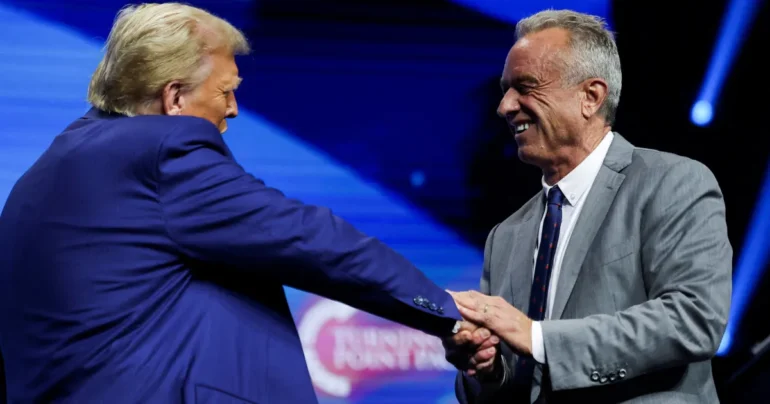The Centers for Disease Control and Prevention (CDC) is undergoing significant changes as President Donald Trump backs Health and Human Services Secretary Robert F. Kennedy Jr.’s efforts to align the agency with the administration’s “Make America Healthy Again” (MAHA) initiative. On August 28, 2025, CDC Director Susan Monarez was removed from her position, sparking debate and prompting resignations from other CDC officials. This move reflects Trump’s commitment to supporting Kennedy’s vision for transforming public health policy.
Leadership Transition at the CDC
On Wednesday, Kennedy announced his intention to replace Monarez, who had been confirmed as CDC director by the Senate in July. After Monarez requested direct confirmation from President Trump, a White House staffer informed her of her termination later that day. White House Press Secretary Karoline Leavitt explained that Monarez’s approach did not align with Trump’s health priorities, emphasizing the president’s mandate following his re-election on November 5, 2024. The administration views Kennedy’s MAHA movement as a key part of its strategy to maintain Republican support in the upcoming midterms.
The decision led to the resignations of four senior CDC officials—Deb Houry, Demetre Daskalakis, Dan Jernigan, and Jennifer Layden—who disagreed with the direction of Kennedy’s policies. These resignations highlight the challenges of implementing significant changes within a major public health agency. Kennedy appointed Jim O’Neill, a trusted deputy, as acting CDC director to guide the agency through this transition.
Trump’s Support for Kennedy’s Vision
President Trump has consistently supported Kennedy’s health initiatives, recognizing the importance of MAHA supporters to the Republican Party’s political strategy. For instance, earlier this month, Trump reinstated Vinay Prasad to a vaccine regulation role at the Food and Drug Administration at Kennedy’s request, despite initial objections from some political allies. Additionally, when Kennedy announced plans to redirect $500 million from mRNA vaccine research on August 5, Trump expressed confidence in moving forward with new priorities, noting that past achievements like Operation Warp Speed were significant but no longer the focus.
During a recent Cabinet meeting, Trump praised Kennedy’s efforts to investigate environmental factors potentially linked to autism, a topic Kennedy has prioritized. “There has to be something artificially causing this,” Trump said, supporting Kennedy’s push to explore health issues like rising autism rates. This alignment underscores Trump’s trust in Kennedy to lead transformative health policy changes.
Congressional Reactions and Oversight
The leadership changes at the CDC have prompted varied responses from Congress. Republican Senator Bill Cassidy, who chairs the Senate Health, Education, Labor, and Pensions Committee, called for oversight of the CDC’s transitions, particularly regarding Kennedy’s new vaccine advisory panel. Senator Susan Collins, chair of the Appropriations Committee, also expressed concern about the rapid changes and supported calls for further review. Both senators, who backed Kennedy’s confirmation as health secretary, will have an opportunity to question him during his scheduled testimony before the Senate Finance Committee on September 4, 2025.
Some Democrats, including Senator Bernie Sanders, have raised concerns about the implications of Monarez’s removal, with her legal team arguing that only the president has the authority to dismiss her. They claim Monarez was committed to maintaining scientific standards, but the administration maintains that the move was necessary to advance its health agenda.
Kennedy’s Plans for the CDC
Kennedy has been vocal about his goal to reform the CDC, which he believes struggled during the COVID-19 pandemic. Speaking at a press conference in Texas on August 28, 2025, alongside Governor Greg Abbott, Kennedy described the agency as facing challenges that require long-term changes to restore its effectiveness. “There’s a lot of trouble at CDC, and it’s going to require getting rid of some people over the long term to bring back pride and self-esteem,” he said. Kennedy’s agenda includes revising vaccine policies and forming a new advisory panel to guide future recommendations.
The appointment of Monarez initially reflected a hope that she would align with Kennedy’s directives, according to sources familiar with the decision. However, her resistance to certain policy shifts led to her replacement by O’Neill, signaling a continued push to reshape the CDC’s priorities.
Looking Ahead
The changes at the CDC mark a pivotal moment for the agency as it navigates its role in public health under Kennedy’s leadership. With Trump’s full support, Kennedy is working to implement his MAHA vision, focusing on issues like vaccine safety and environmental health concerns. As the CDC prepares for a key vaccine recommendation meeting in mid-September, the administration’s health policies will face increased scrutiny from Congress and the public. The coming weeks will be crucial in determining how these changes shape the future of the CDC and its mission to protect public health.
